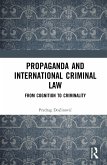Drawing from scholarship across law, history, politics and philosophy, Self-Defence in International and Criminal Law provides a broad and interdisciplinary approach to the doctrine of self-defence in both domestic criminal and international law. It focuses on the requirement of imminence, which deals with the question of when individuals or States may legitimately resort to defensive force against a serious danger or harm. In both national and international law the imminence requirement, if strictly applied, renders any defensive measure taken in anticipation of a would-be attack illegal. Recently, however, attempts have been made to relax the temporal requirement of the self-defence doctrine (imminence) with a view to allowing individuals or States to employ deadly force to arrest an anticipated threat when they 'believe' that using 'pre-emptive' lethal force would be the only way to thwart an expected harm. In domestic criminal law, it has been argued that it is necessary to relax the rule of imminence in domestic violence cases where women employ lethal force against their abusive partners when there is no imminent threat to justify defensive force. At the international level, while there has long been controversy as to the justifiability of pre-emptive force in non-confrontational settings, following the September 11 attacks, the Bush Administration's 'war on terror' policy radically shifted the focus from the notion of anticipation to that of prevention, making it clear that, if necessary, it would invoke unilateral force against emerging threats before they are fully formed. The book surveys the roots, role, rationale, and objectives of self-defence and questions whether the requirement of imminence should be removed from the traditional contours of the self-defence doctrine in national and international law.
Hinweis: Dieser Artikel kann nur an eine deutsche Lieferadresse ausgeliefert werden.
Hinweis: Dieser Artikel kann nur an eine deutsche Lieferadresse ausgeliefert werden.








